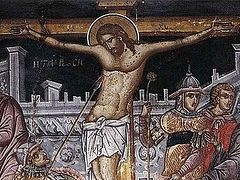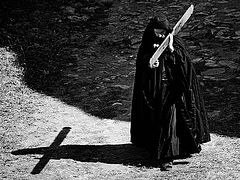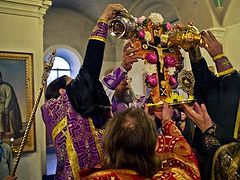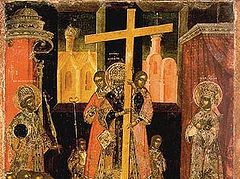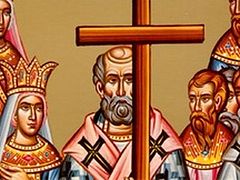Source: The Saint Gregory Palamas Outreach
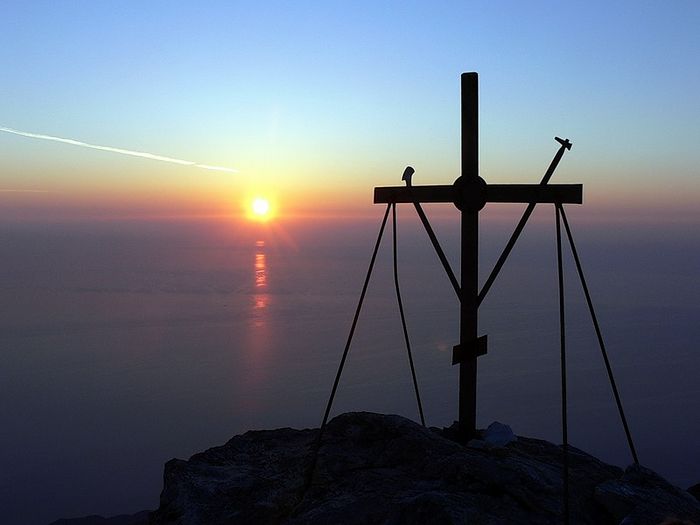
In the name of the Father, and of the Son, and of the Holy Spirit,
My dear brothers and sisters in Christ, today brings us to the third Sunday of the Great and Holy Fast, or, as the Church refers to this Sunday, the Sunday of the Veneration of the Precious and Life-Giving Cross.
The Church gives us the cross at this point, the halfway point, of the fast to inspire us. The cross is given to show us the direction in which we are headed; that we are headed to the crucifixion of our Lord and His Holy Resurrection. This should be where we are headed with our own lives; the crucifixion of our self-will that allows us to perform God’s will, which allows our lives to be resurrected to the life that God intended for us.
The cross is also provided to sweeten the fast because by this time in the fast we start to feel the bitterness of fasting. This bitterness is experienced through our denial of the body through food and the denial of our will by not doing what we want to do. The cross is like the wood that Moses plunged into the bitter waters of Marah to sweeten them to make them drinkable (Exodus 15:23-25). Through seeing the cross, we are comforted that there is the joy of Pascha ahead of us, and the fast becomes a little easier.
In today’s Gospel, we hear our Lord say: “Whosoever will come after me, let him deny himself, and take up his cross, and follow me.” This verse from the Gospel starts with a decision that each of us must make with the words, “Whosoever will come after me.” This decision is an action of our free will. Saint John Chrysostom illustrates the words of the Lord with the following: “I do not force, I do not compel, but each one I make lord of his own choice.”
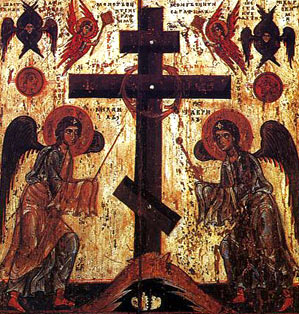 The question we have to ask ourselves when we look at this verse is, "What type of choice is the Lord asking us to make?" Saint John Chrysostom states that this must be a choice for good things, otherwise the Lord would compel us to make this choice. Saint John goes on to say that this choice does not eliminate hardship from our lives with the following: “To hinder you from having any trial at all those hardships, yet such is not for My will for your sake, that you may yourself contribute something, and be more approved.” In other words, the hardships that we endure in this life as followers of Christ are the work that we must perform of our own free will for the building up of the Gospel and the Church in order to receive the blessings of God.
The question we have to ask ourselves when we look at this verse is, "What type of choice is the Lord asking us to make?" Saint John Chrysostom states that this must be a choice for good things, otherwise the Lord would compel us to make this choice. Saint John goes on to say that this choice does not eliminate hardship from our lives with the following: “To hinder you from having any trial at all those hardships, yet such is not for My will for your sake, that you may yourself contribute something, and be more approved.” In other words, the hardships that we endure in this life as followers of Christ are the work that we must perform of our own free will for the building up of the Gospel and the Church in order to receive the blessings of God.
The next phrase of this verse is, “Let him deny himself.” What is this denial of self? There are two types of denial of self. The first type of denial is the denial of self that Adam experienced. For the sake of sin, Adam denied that God created him to live in harmony with Him. Not only did Adam use his will contrary to the will of God, but he clung to a lie. The lie was that he was not responsible for his actions (Genesis 3:12).
When we examine our lives for confession, we should find the same denial of what God created us to be. We should see how we have exerted our will over God’s will, as well as the lies that we have told ourselves. What are these lies? Some examples are: I am better than I really am financially, morally etc., or if I am addicted to drugs, alcohol, cigarettes or some other passion that I can't stop at any time. These lies that we tell ourselves are an illusion of our true way of living. The denial of this illusion of self is the second type of denial of self that Christ is speaking of in this portion of the verse.
This denial of the illusion of self is the restoration of the harmony between God’s will and our own will. Through this denial of the lies about ourselves, we will deny those things that bind us to the earth and replace them with spirituality, that passions will be replaced by virtues. Most of all, the fear we have of God, that He is punishing us in this life, and our grumbling against Him, will be replaced with obedience to Him and love for Him. We will realize that the difficulties we experience are self-inflicted as a result of our misuse of our free will.
 Saint Nikolaj Velimirovic The next phrase of this verse is, “Take up his cross.” What does it mean to take up one's cross? Saint Nikolaj Velimirovic answers this question in the following manner: “It means the willing acceptance, at the hand of Providence, of every means of healing, bitter though it may be, that is offered. Do great catastrophes fall on you? Be obedient to God’s will, as Noah was. Is sacrifice demanded of you? Give yourself into God’s hands with the same faith as Abram had when he went to sacrifice his son. Is your property ruined? Do your children die suddenly? Suffer it all with patience, cleaving to God in your heart, as Job did. Do your friends forsake you, and you find yourself surrounded by enemies? Bear it all without grumbling and with faith in hand, as the apostles did. Are you condemned to death for Christ? Be thankful to God for such an honor, like thousands of Christian martyrs.”
Saint Nikolaj Velimirovic The next phrase of this verse is, “Take up his cross.” What does it mean to take up one's cross? Saint Nikolaj Velimirovic answers this question in the following manner: “It means the willing acceptance, at the hand of Providence, of every means of healing, bitter though it may be, that is offered. Do great catastrophes fall on you? Be obedient to God’s will, as Noah was. Is sacrifice demanded of you? Give yourself into God’s hands with the same faith as Abram had when he went to sacrifice his son. Is your property ruined? Do your children die suddenly? Suffer it all with patience, cleaving to God in your heart, as Job did. Do your friends forsake you, and you find yourself surrounded by enemies? Bear it all without grumbling and with faith in hand, as the apostles did. Are you condemned to death for Christ? Be thankful to God for such an honor, like thousands of Christian martyrs.”
This verse completes with the words, “Follow me.” These words are probably the most difficult for us. What does it mean for us to follow or accompany Christ to the cross? It means to go against all that this world holds as important, as Saint Paul reminds us in his Epistle to the Corinthians: “For the Jews require a sign, and the Greeks seek after wisdom: But we preach Christ crucified, unto the Jews a stumbling block, and unto the Greeks foolishness; But unto them which are called, both Jews and Greeks, Christ the power of God, and the wisdom of God. Because the foolishness of God is wiser than men; and the weakness of God is stronger than men. For you see your calling, brethren, how that not many wise men after the flesh, not many mighty, not many noble, are called: But God has chosen the foolish things of the world to confound the wise; and God hath chosen the weak things of the world to confound the things which are mighty” (1 Corinthians 1:22-27).
So, my prayer for you, my dear brothers and sisters in Christ, is that you will be willing to pick up and embrace the way of the cross, that you may follow the ways of Christ, which are foolishness to this world, but which will sweeten your life in immeasurable ways.
Amen.

